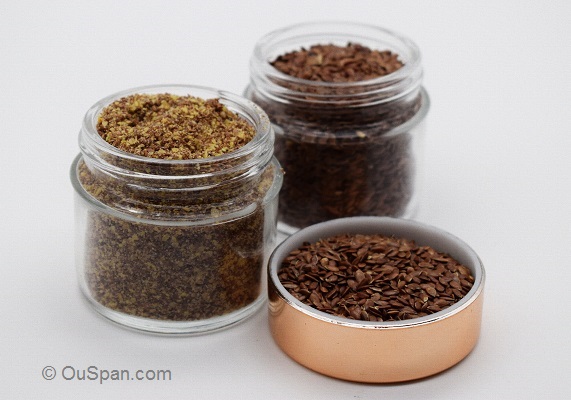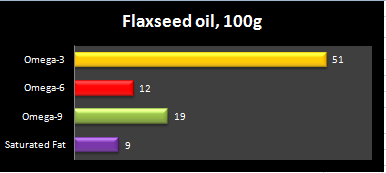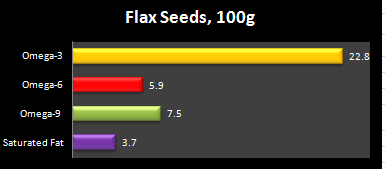
Takeaways
• Flaxseed is a great source of the plant form of Omega-3 and Omega-6 fatty acids
• Benefits include reduction of the risk of cardiovascular disease, high cholesterol levels, atherosclerosis
• Flax has one of the highest concentrations of lignans that decrease the risk of diabetes
• Before eating flaxseed, grind it in a coffee grinder
A nutritional treasure, flaxseed is a great source of health-beneficial components including the plant form of Omega-3 and Omega-6 fatty acids, lignans – plant organic compounds, dietary fiber, minerals, and vitamins.
Centuries ago, flax or linseed was used for the production of linen's textile. Flax cultivation in the present-day Republic of Georgia is dated to 3000 BC. In the 8th century, linseed oil was introduced by French king Charlemagne as beneficial for human health. He passed laws requiring its consumption. In the 17th century, English botanist Nicholas Culpeper introduced flax and linseed as natural cures for inflammations and tumors.
Omega-3 and Omega-6 in Flaxseed
Flaxseed contains two essential fatty acids: alpha-linolenic (ALA) and linoleic acid (LA). LA and ALA are called essential fatty acids because they cannot be produced by the body and should be obtained from the diet. ALA belongs to the family of Omega-3 and LA is Omega-6 fatty acid. In the human body, ALA could be partially converted into two omega-3 fatty acids: eicosapentaenoic (EPA) and docosahexaenoic (DHA).
Mainly ALA is used as an energy source. A number of health benefits have been associated with EPA and DHA. EPA and DHA are mostly obtained from seafood products.
In the human body linoleic acid is converted to gamma-linolenic (GLA) and then to arachidonic acid (AA). GLA is converted to hormone-like substance prostaglandins. Some studies suggest that GLA protects DNA, fights inflammation, decreases high blood pressure, and relieves diabetic nerve and rheumatoid arthritis pains.
Some studies have shown that it can protect against diabetes, reduce high cholesterol levels and the risk of atherosclerosis.
Unsaturated Fat Content in Flax Seeds & Flax seed Oil


Lignans
Lignans are polyphenols found in plants. In the human intestine, lignan precursors are converted into the enterolignans, enterodiol, and enterolactone by bacteria. All of those components are phytoestrogens that may mimic estrogen effects. Lignans are found in other seed such as sesame seeds, whole grains fruits, and vegetables, but flaxseed is the richest source of this powerful agent.
Lignans are natural phytonutrients and phytoestrogens with health benefits:
- Possess protective effects against many types of cancers
- Support the immune system
- Protective effect against diabetes risk
- Have anti-inflammatory and antioxidative effects
- Help with menopause symptoms.
Flax has one of the highest concentrations of lignans (0.3g on 100g). Other fiber-riсh foods such as sesame seeds, rye, wheat, oat, barley, soybeans, pumpkin, broccoli, cabbage, apricots, and strawberries are a good source of lignans.
Dietary fiber
Flax contains two forms of dietary fiber: soluble and insoluble. Both forms play important but different roles in the digestive system, preventing and reducing the risks of some diseases.
Soluble fiber is dissolved by water, forms a jelly-like substance that helps lower LPD cholesterol and glucose level in the blood.
Insoluble fiber soaks up water, creates volume, and promotes bowel motility. This type of fiber helps relieve constipation, prevents the risk of diverticular disease, softens stool reducing the discomfort associated with hemorrhoids.
Minerals and vitamins
Flaxseed is rich in B vitamins complexes such as Riboflavin, Niacin, Thiamine, Pantothenic acid, Pyridoxine, and Folic acid. B complex is essential for liver and spleen function; helps promote healthy eyes, skin, and hair; and important for the nervous system functioning and mental activity. B vitamins participate in the metabolism of fats, proteins, and carbohydrates. The power antioxidants such as vitamins E and Vitamin C, as well as vitamin K are found in flax.
Flaxseed contains minerals: potassium, manganese, calcium, magnesium, iron, zinc and selenium.
Health Benefits Flaxseed & Flaxseed Oil
| Diabetes
Flaxseed compounds such as Omega-3 fatty acids, dietary fibers, and lignans improve fasting blood glucose in people with type 2 diabetes or prediabetes. Recent research demonstrated that lignan inhibits expression of the phosphoenolpyruvate carboxykinase gene, which is responsible for a key enzyme that, in turn, manages glucose synthesis in the liver.
According to the research published in NCBI, supplementation of the diet of type 2 diabetics with 10g (1 tablespoon) of flaxseed powder for one month decreased fasting blood glucose by 19.7% and glycated hemoglobin by 15.6%.
Flaxseed oil has no similar effect on fasting blood serum glucose and insulin levels but linoleic acid that is presented in flaxseed and flaxseed oil may reduce diabetic nerve pain.
| Tumor and cancer
Flaxseed inhibits the formation of colon, breast, skin, and lung tumors and also reduces the risk of ovarian cancer. The scientists suggest that preventive effect of flaxseed on early stages of cancer is associated with the fact that flaxseed contains the highest level of lignans, which have antioxidant properties and, also, able to alter estrogen metabolism, which may reduce ovarian cancer risk.
| Cardiovascular diseases
Linoleic acid that found in flaxseed and flaxseed oil protects DNA, decreases high blood pressure, reduces high cholesterol levels and, accordingly, the risk of atherosclerosis.
| Obesity
Flaxseed fibers form a viscous substance upon hydration that delays emptying of the digestive track emptying and nutrient absorption from the small intestine.
Flaxseed has antioxidant, inflammatory, lipid and glycemic lowering properties that may contribute towards weight loss. Stable blood glucose levels decrease uncontrollable cravings.
How to Use and Store Flax Seeds
Do not consume the whole flax seed. If you do, it will go through your gastrointestinal tract undigested. Before eating flaxseed, grind it in a coffee grinder until it looks like flour. Ground flaxseed can be added to any food: cereal, soup, smoothies, beef and vegetable stew, and so on.
According to the flax experts, the optimal dose to get health benefits is one-to-two tablespoons (5-10g) of ground flax seeds. Studies show that for natural treatment of bowel syndrome adults can consume up to 50 grams daily for four weeks, drinking enough amount of water to avoid bowel obstruction.
Flaxseeds consumption is thought to be preferable because pure flax oil does not contain lignans and dietary fiber. For the oil, the recommended daily dose is one to two tablespoons per day. Flaxseed has a blood-thinning effect. It can prevent blood clots from forming. On the other hand, it may elevate the risk of bleeding.
Do not exceed two tablespoons daily and talk to your doctor if you are already taking anticoagulants or other substances like aspirin, ibuprofen, or sodium citrate.
Flaxseeds and flaxseed oil are recommended to be stored in a dark place. Whole flax seeds can be stored at room temperature in a cool and dry place during the year. Keep ground flaxseed in your freezer. Use a sealed plastic bag to avoid oxidizing. Flaxseed oil should be stored in an opaque bottle in the refrigerator.
American Nutrition Association
Frank W. Hoffmann, Martin Manning. "Herbal Medicine and Botanical Medical Fads"


